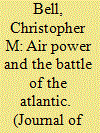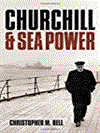| Srl | Item |
| 1 |
ID:
140931


|
|
|
|
|
| Summary/Abstract |
The prioritization of strategic bombing over trade defense by the British Air Ministry, Bomber Command, and Winston Churchill did not delay the acquisition of Very Long Range aircraft to close the Atlantic “air gap” until May 1943. The Royal Air Force’s Coastal Command possessed enough aircraft to provide air cover in the mid-Atlantic sooner than it did. The Admiralty and Coastal Command were slow to identify the need for land-based air cover in the mid-Atlantic because the U-boat threat did not develop there until mid-1942, because they expected escort carriers to provide a solution, and for technical and doctrinal reasons.
|
|
|
|
|
|
|
|
|
|
|
|
|
|
|
|
| 2 |
ID:
148374


|
|
|
|
|
| Publication |
Oxford, Oxford University Press, 2014.
|
| Description |
xvi, 429p.: plates, mapspbk
|
| Standard Number |
9780199678501
|
|
|
|
|
|
|
|
|
|
|
|
Copies: C:1/I:0,R:0,Q:0
Circulation
| Accession# | Call# | Current Location | Status | Policy | Location |
| 058855 | 359.0309410904/BEL 058855 | Main | On Shelf | General | |
|
|
|
|
| 3 |
ID:
144525


|
|
|
|
|
| Summary/Abstract |
Revisionist historians have argued that in July 1914 Britain’s First Lord of the Admiralty, Winston Churchill, was preparing to implement a ‘Naval Revolution’ based on radical ideas they attribute to Admiral Sir John Fisher. This article examines Fisher’s influence on Churchill in 1911–14. By subjecting the revisionist argument to rigorous scrutiny, it demonstrates that Churchill did not embrace either ‘flotilla defence’ or the ‘battlecruiser concept’, the two central components of Fisher’s supposed radical agenda. On the eve of war, Churchill’s immediate goals were neither revolutionary nor inspired by Fisher. The weakness of the revisionists’ argument undermines their broad interpretation of naval policy during the Fisher era.
|
|
|
|
|
|
|
|
|
|
|
|
|
|
|
|
| 4 |
ID:
047437


|
|
|
|
|
| Publication |
Houndmills, macmillan Press, 2000.
|
| Description |
xx, 232p.
|
| Standard Number |
0333804759
|
|
|
|
|
|
|
|
|
|
|
|
Copies: C:1/I:0,R:0,Q:0
Circulation
| Accession# | Call# | Current Location | Status | Policy | Location |
| 043383 | 359.00941/BEL 043383 | Main | On Shelf | General | |
|
|
|
|
| 5 |
ID:
100738


|
|
|
|
|
| Publication |
2010.
|
| Summary/Abstract |
Winston Churchill's propagation of the infamous "ten year rule" has led to charges that he created the deficiencies in Britain's defences that he denounced during the 1930s. This article shows that traditional explanations for Churchill's attacks on defence spending during his tenure as Chancellor of the Exchequer (1924-29) oversimplify his motives and exaggerate his authority. His policies were shaped by a complex and shifting combination of political, financial, strategic, and bureaucratic goals. Churchill was not the instigator of the ten year rule in 1919, and he cannot be held responsible for its effects after leaving office. Even during the 1920s, the impact of the ten year rule was more modest than historians have generally recognized.
|
|
|
|
|
|
|
|
|
|
|
|
|
|
|
|